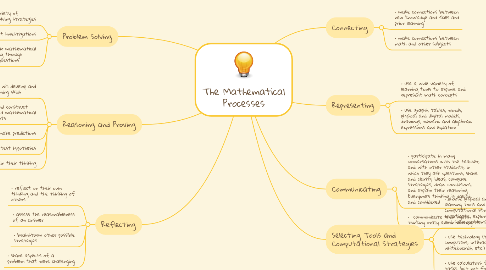The Mathematical Processes
von Gillian Dunseith

1. Problem Solving
1.1. • use a variety of problem-solving strategies
1.2. • conduct investigations
1.3. • deepen their mathematical understanding through thoughtful questions
2. Reasoning and Proving
2.1. • Students will develop and apply reasoning skills
2.2. • plan and construct organized mathematical arguments
2.3. • make predictions
2.4. • test hypotheses
2.5. • explain their thinking
3. Reflecting
3.1. • reflect on their own thinking and the thinking of others
3.2. • assess the reasonableness of an answer
3.3. • brainstorm other possible strategies
3.4. • share aspects of a problem that were challenging
4. Selecting Tools and Computational Strategies
4.1. • choose physical and digital learning tools and computational strategies to investigate, explore, represent, and solve problems
4.2. • use technology (tablets, computers, interactive whiteboards, etc.)
4.3. • use calculators for some tasks, but not for all tasks, depending on the goal of the lesson
5. Connecting
5.1. • make connections between new knowledge and skills and prior learning
5.2. • make connections between math and other subjects
6. Representing
6.1. • use a wide variety of learning tools to explore and represent math concepts
6.2. • use graphs, tables, words, physical and digital models, drawings, numeric and algebraic expressions and equation
7. Communicating
7.1. • participate in many conversations with the teacher, and with other students, in which they ask questions, share and clarify ideas, compare strategies, draw conclusions, and explain their reasoning. Everyone’s thinking is valued and considered
7.2. • communicate their math thinking orally and in writing


